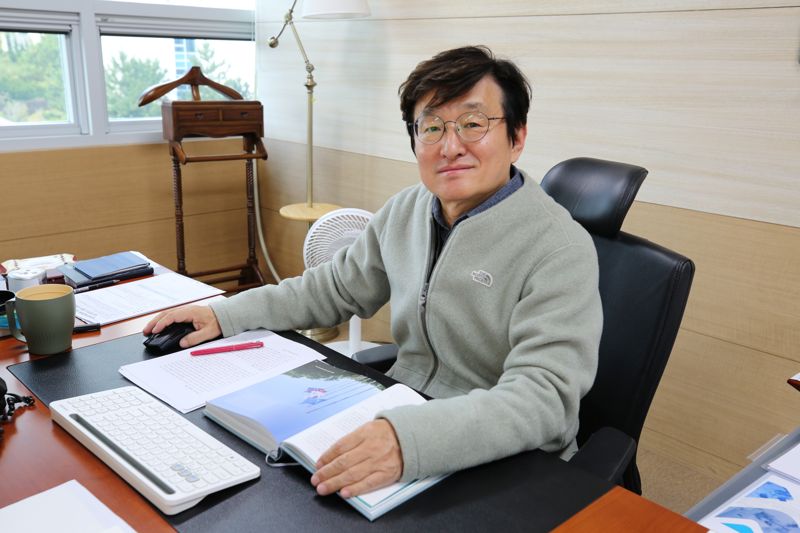Kim Dong-sung, Head of Jeju Research Institute at KIOST: “Strengthening Future-Oriented Marine Research Centered on the Smart Integrated Marine Cultivation Center” [FN People]
- Input
- 2025-11-20 14:25:09
- Updated
- 2025-11-20 14:25:09

"On the occasion of the 10th anniversary of the Jeju Research Institute on the 11th, we will further strengthen future-oriented marine research that integrates climate, ecology, and biotechnology, centered on the newly established Smart Integrated Marine Cultivation Center."
Kim Dong-sung, Director of the Jeju Research Institute at the Korea Institute of Ocean Science and Technology (KIOST),spoke on the significance of the institute’s 10th anniversary on the 20th. Kim is a rare expert in the field of deep-sea hydrothermal vent ecosystems in Korea. These ecosystems, found at depths of 2,000 to 4,000 meters where sunlight does not reach, are among the most extreme and unique on Earth. Instead of relying on sunlight, organisms here use high temperatures, high pressure, and toxic chemicals emitted from hydrothermal vents on the seafloor as their energy source.
Kim’s expertise aligns with the founding purpose of the Jeju Research Institute, which serves as a regional research base for studying the marine environment, ecology, climate, and resources of the southern coast of the Korean Peninsula, including the waters around Jeju, the South Sea, and the East China Sea.
Kim explained, "The newly completed Smart Integrated Marine Cultivation Center, built for the 10th anniversary of the Jeju Research Institute, is a core research infrastructure that enables the study of ecosystem responses to climate and environmental changes, the establishment of a foundation for the industrialization of marine biological materials, and the development and mass production of microalgae and seaweed technologies." He added, "Based on this, we plan to strengthen research capabilities utilizing Jeju’s unique marine environment and contribute to enhancing the competitiveness of the marine bioindustry."
Since its opening in 2015, the Jeju Research Institute has achieved various results, focusing on two pillars: marine bioindustrialization and climate change response. In the marine bio field, the institute has conducted research on developing high-value-added materials using fishery by-products. Since 2022, through the 'Marine Fisheries By-product Biomaterial Technology Development' project, the institute has developed domestic technology to efficiently produce Polydeoxyribonucleotide (PDRN) and Proteoglycan, which promote skin regeneration, anti-inflammation, and tissue regeneration from salmon by-products.
He stated, "Unlike conventional methods, this technology applies an eco-friendly process to improve productivity and price competitiveness, and it has laid the foundation for immediate industrial application in pharmaceuticals, cosmetics, and health functional foods." He continued, "Through research on new drug candidates derived from marine microorganisms, we have secured five new antibiotics effective against antibiotic-resistant bacteria and one broad-spectrum antibiotic derivative, demonstrating the potential for developing marine-derived antibiotics."
The institute has also achieved meaningful results in climate change response research. The Jeju Research Institute has been monitoring long-term sea temperature changes around Jeju and analyzing the northward migration of Sargassum and a sharp decline in seaweed production (about a 97% decrease) due to subtropical marine environmental changes. Based on these findings, the institute is developing management technologies for subtropical species, predicting future marine environmental variability, and providing fundamental data for coastal environment and marine fisheries policy development.
Kim emphasized that the new vision declared at the 10th anniversary ceremony, 'Innovation Starting from the Jeju Sea, Becoming a Marine Science Hub Connecting the Pacific Rim,' clearly outlines the institute’s future direction.
He stated, "We will actively expand international cooperation and global research networks so that research innovation based on the Jeju Sea can extend throughout the entire Pacific Rim." He added, "The Jeju Research Institute will continue to strive to produce marine science achievements that are tangible to the public and industry, and to become a key national marine research hub that grows together with the Jeju region."
leeyb@fnnews.com Lee Yu-beom Reporter